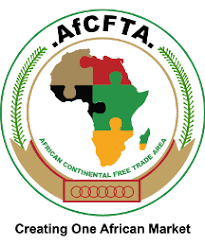By Oghale Mafuru
Nigeria ratified its membership of the African Continental Free Trade Area (AfCFTA) on the 11th of November 2020, more than a year after Nigeria signed the African Continental Free Trade Agreement in July 2019.
The Agreement which establishes a single market for goods and services connects 1.3 billion people across 55 countries with a combined Gross Domestic Product (GDP) valued at US$3.4 trillion, allowing free movement of business travelers and investments, and creates a unified customs union to streamline trade on the continent.
The questions begging for answers are how much of this projected sum of US$3.4 trillion will be accrued to the country? How will much of an impact will this pact have on Nigerian brands? Needless to state that the country’s 200 million population is a huge market that is very vital to the success of the Trade agreement.
Although Nigeria delayed rectifying the agreement due to concerns emanating from smuggling among others issues, it however reconsidered its position having accessed the prospect of the trade agreement in accelerating economic growth of the country.
However, there are concerns that despite the fact that the free trade agreement presents a huge prospect for increased foreign earnings, trade and investment, it is unlikely how much of an impact this agreement will have on a country with over 200 million population.
While the agreement aims to facilitate easy trade among member countries through measures aimed at reducing trade barriers and border restrictions, Experiential Marketing Expert and CEO of Brands Optimal, Mr. Otis Ojeikhoa, said the African Continental Free Trade Agreement will essentially benefit the manufacturing sector noting that the Advertising industry has been doing business beyond the shores of the country before the inception of the pact.
He said “There is really no impact of the agreement on the Advertising and Marketing industry. We are already getting business outside the country. We have partners we are working with in those countries when we have businesses. I think the agreement will benefit the manufacturing sector since goods can be exported to other countries”.
Speaking about the impact of the free trade agreement on the nation’s economy, Business Consultant Dr. Chukwudi Ekwukoma said “if you look at the free trade area, first of all the agricultural sector is supposed to benefit. The free trade area is going to attract investors. The benefit is not going to be evenly distributed as benefit cannot come under insecurity” adding the manufacturing, hospitality, aviation and transportation sectors can without an iota of doubt benefit from AFCTA if the country is in an ideal state.
He added that “ if you look at Nigeria, it will be difficult to say at any level we are going to benefit because when you look at the manufacturing, agricultural sectors, our indices are going down in those areas” noting that the economic instability exacerbated by increasing insecurity will in no doubt hamper the country’s potential of benefiting from the agreement.
While the Government makes frantic efforts to stimulate economic growth through various intervention initiatives targeted at reviving the ailing manufacturing sector, it is expedient that the issue of insecurity is tackled comprehensively as potential growth is stifled by unrest and chaos







Comment
No comments found.